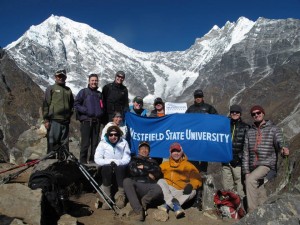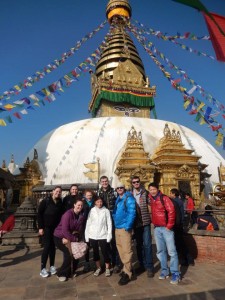
Westfield State students and professor pose on top of a 15,000 foot peak in Langtang, Nepal. Back row from left to right: Saroj Rai, Alexandra Henry, Michaela Quimby, Chelsea Reynolds, Nick Stone, Anish Rai, Patrick Bartel, John Bartel. Front row from left to right: Shannon Grossman, Adrianne Stelmack, Palden Sherpa, Kevin Tatsugawa. (Photo submitted)
WESTFIELD – Winter break is a time that many chose to sit back and relax, but a small group of Westfield State students had other plans.
In January, eight students traveled to Nepal as part of a special topics short-term study abroad class which focused around wilderness education. Led by Kevin Tatsugawa, assistant professor of movement science and coordinator of the Wilderness Leadership program, students learned Leave No Trace principles, hiking, camping, and backpacking skills. The course also explored high altitude medicine as students learned individual and group safety tactics and the proper balance between risk potential and educational benefits of adventure.
Wilderness education is a topic that Tatsugawa said hikers should not take lightly. He said it is important to research the area you plan to visit in order to assess all the risks involved and prepare for any potential complications.
Tatsugawa has trekked many mountains, but he chose Nepal as the destination for the course because of his familiarity with the country. Prior to the January course, Tatsugawa traveled to Nepal seven times to climb, guide, volunteer, conduct research, and even present a paper. He’s also familiar with the cultural traditions of the country which include greeting people with “Namaste” and walking clockwise around religious artifacts and temples.
The expedition included trekking and climbing the Himalayas. Student John Bartel ’15, who has participated in three other J-term classes, was amazed by the mountains.
“When we were flying into Kathmandu we could see all of the mountain ranges and as we drove into the mountains and began to trek in them, I truly realized that this is not only one of the best kept secrets of the world but that it is also among the most beautiful,” said Bartel. “Every day when trekking we would see enormous snowcapped mountains and often were hiking on top of them.”
Student Shannon Grossman ’16 said the views from the mountains gave her a sense of appreciation for life.

Westfield State group poses in front of Swayambhunath stupa. Back row from left to right: Micheala Quimby, Alexandra Henry, Adrianne Stelmack, Patrick Bartel, John Bartel, Kevin Tatsugawa.
Front row from left to right: Chelsea Reynolds, Shannon Grossman, Nick Stone. (Photo submitted)
“One of the things I believe I learned more fully though this course was to appreciate things, no matter how small,” Grossman said. “Just taking a look around me when I was trekking, I was in this beautiful world and I learned to appreciate the beauty of nature even more. Sometimes things can get tough, but there is always something that makes it a little bit easier. The tough parts won’t last forever, but when you’re busy worrying and stressing over the tough things, you forget to appreciate the good things and what you have at that moment.”
In addition to hiking, students visited religious sites including the UNESCO World Heritage site Boudanath stupa, a Buddhist temple. Tatsugawa borrowed a drone from the Ely Library and used it to collect video footage at the temple. For some students, learning about Buddhist practices and customs was life-changing.
“I have a new found interest in Buddhism,” said Bartel. “It’s a beautiful religion with amazing morals, stories, practices, and principles. This trip made me want to convert to Buddhism having learned about it more.”
For Tatsugawa, the best part of the trip was seeing his students’ first reactions to a country and culture he knows so well.
“The most enjoyable part of the trip, by far, was seeing Nepal, the Nepali people, the culture and the Himalayas from the ‘beginner’s’ mind,” Tatsugawa. “I have been to Nepal eight times and I enjoy it every time I go there. But when I take young, enthusiastic people such as my students, I am able to experience it as if I have never been there before.”

